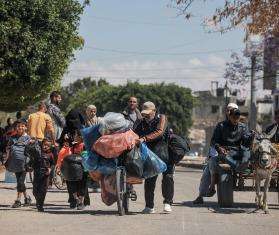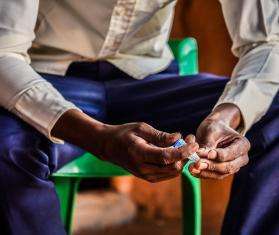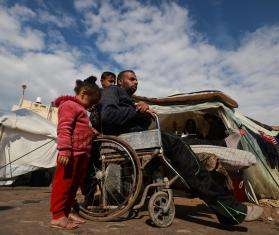GOMA/NEW YORK, MAY 9, 2023—The international medical humanitarian organization Doctors Without Borders/Médecins Sans Frontières (MSF) provided care to 674 victims of sexual violence in the last two weeks of April in camps for displaced people around Goma, the capital of eastern Democratic Republic of Congo’s (DRC) North Kivu province. This shocking number—approximately 48 people per day, mostly women—highlights the extreme risk of violence facing displaced people in the area.
"For months our teams have been treating a high number of [people for sexual violence], but never before on the catastrophic scale of recent weeks,” says Jason Rizzo, MSF emergency coordinator in North Kivu. “Nearly 60 percent of victims [came to MSF] within 72 hours of the attack, showing [the urgency of this] ongoing medical and humanitarian emergency.”
Almost all of the survivors treated by MSF were women, and the majority said they were attacked while searching for food or firewood outside of the displacement camps. "After we arrived here, one of my children started to show signs of malnutrition,” said one woman in Rusayo camp who received care after experiencing sexual violence. “I couldn't stand by and do nothing. I decided to go to the forest to collect wood to sell so I could buy food. That's when I came across [armed men] who attacked me."
Clashes between the Congolese army, the M23 armed group, and other armed groups in North Kivu have forced more than one million people to flee their homes since March 2022. More than 600,000 have sought refuge in often overcrowded, unsanitary camps on the outskirts of Goma.
Between April 17 and 30, 2023, MSF teams treated 314 victims of sexual violence in Bulengo, Lushagala, Kanyaruchinya, Eloime, and Munigi camps. And 360 in Rusayo—one of the newest and most densely populated camps, west of Goma. In Rusayo, Bulengo, and Kanyaruchinya, more than half of the survivors reported being attacked by armed men.
Those who seek care for sexual violence from MSF likely represent only a fraction of the true number of victims as MSF is not present in all camps and there are many other barriers to seeking care, including stigma or not knowing that care is available.
Despite various humanitarian and relief organizations increasing their response in recent weeks, there is a critical shortage of humanitarian assistance in the area. Because of this, people in displacement camps not only face the risk of violence, but living conditions remain disastrous and people lack the most basic necessities such as food, latrines, water, and shelter.
"It is urgent to improve people’s living conditions in the camps,” said Rizzo. “Basic needs such as access to food, water, and sanitation, must be guaranteed. Protection measures must be provided to keep people out of harm's way."
MSF provides free and confidential medical and psychological care to all victims of sexual violence in the main camps for displaced people around Goma. It’s important that victims of rape receive medical care within 72 hours of the attack so that they can be protected against HIV and receive emergency contraception. But important care, including mental health care, can be provided at any time after sexual violence.




